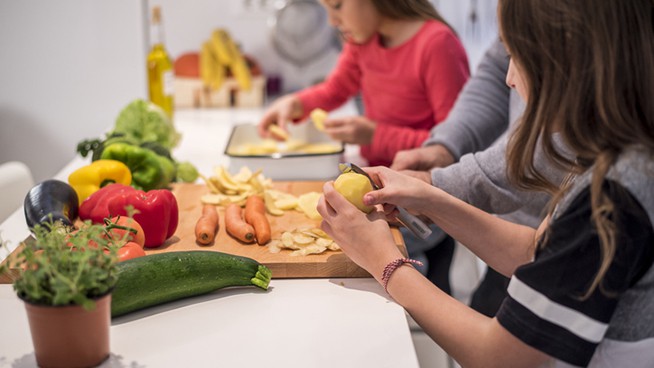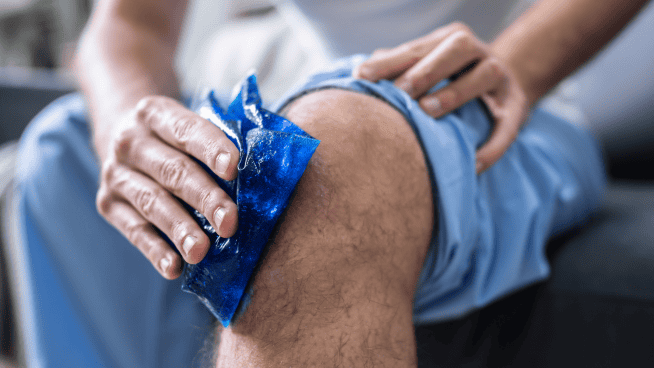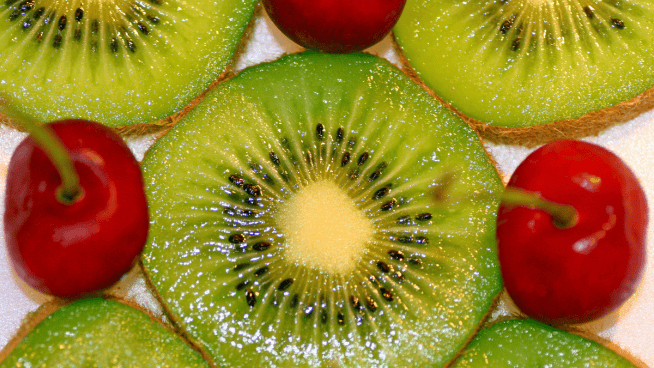Grocery List for Eating Healthy on a Budget
Pretty soon, college athletes everywhere will be heading off to school. A big struggle for many athletes is learning how to control expenses, which quickly add up when they’re living away from home. Dealing with academic, sports and housing costs while trying to save money for food, beverages and entertainment is tough. And for student-athletes, nutritious meals are especially important for staying healthy for their sport.
The good news: it’s easier than you think to eat healthy for cheap. Cutting costs at the supermarket can be as simple as purchasing bulk canned goods or dried items. These last longer and don’t require refrigeration. Here are some cost-efficient products to stock up on for your back-to-school grocery run.
Beverages
1. Water
Buy either packs of bottled water or get a commercial filtered water pitcher, the kind you fill with tap water and refrigerate. Water is not only necessary for hydration, but for overall wellness. Being well hydrated promotes energy, aids in recovery, boosts lean muscle growth and promotes fat-burning metabolism for exercise and sports.
2. Powdered Milk
Is your favorite post-workout fuel chocolate milk? Mix protein-rich powdered milk with water, add heart-friendly cocoa powder and a teaspoon of sugar. Homemade powdered chocolate milk has the same ideal post-workout 4:1 carb to protein ratio as the commercial varieties.
3. Black or Green Teas
Caffeinated or decaffeinated black or green teas are also healthy beverages. Buy a few inexpensive boxes of tea bags and enjoy one or two cups of tea per day (hot or iced) to enhance fat-burning metabolism and boost your immune system.
Convenient, Inexpensive Protein Foods
1. Canned Fish
Stock your dorm with muscle-building/memory-enhancing canned tuna or salmon. Affordable canned fish is rich in protein and contains essential fatty acids for optimizing heart and brain health. Flavor canned fish with lemon juice and olive oil. Have at least two or three servings per week to improve your capacity for memorization during academic tests and sports drills.
2. Nuts, Seeds and Nut Butters
Natural peanut/almond butter, nuts and seeds contain muscle-building protein, heart-friendly fats and immune-system-boosting antioxidants. Athletes need healthy hearts to perform intense workouts and to enhance their endurance for lengthy practices and games. Nuts make terrific portable snacks when combined with fruits or veggies. However, nuts and seeds do not have long shelf lives. Consume them within a few weeks after opening as they can go rancid. Refrigerate peanut butter once the jar has been opened.
3. Canned Red, White and Black Beans
Canned beans store well for long periods and have immune-system-boosting antioxidants. Be sure to drain the excess sodium from the beans in a strainer. Flavor them with some pepper and olive oil or mix with salad greens.
4. Cheese
Varieties of hard cheeses last longer in the refrigerator compared to other dairy products. They also contain moderate amounts of protein. Combine sliced cheese with nuts, whole grain crackers and/or dried or raw fruits or veggies for a nutrient-dense convenient and portable small meal.
5. Eggs
A top source of muscle-building protein, nutritious and affordable eggs also have bone-building vitamin D and vision-protecting antioxidants. Eggs are really versatile. Hard boil them for fast snacks or microwave a scramble or an omelet for breakfast, lunch or dinner. Make several hard-boiled eggs and refrigerate them. They last about a week in the fridge. Chop them in salads or have them as a side dish with veggies. A carton of eggs should be consumed within two weeks. Refrigerate your eggs and keep them covered at all times for freshness.
Low-Cost, Longer-Lasting Carbohydrate Sources
1. Fruits and Veggies
Buy long-lasting and affordable carbohydrate sources like dried fruits, apples and canned fruit in natural juice. Microwaveable potatoes and yams are also low-cost hearty side dishes. Carrots and celery sticks last well in the fridge and make convenient and nutritious snacks combined with whole grain crackers and a protein source. Canned or jarred olives are also a nourishing heart-healthy food. Like salted nuts, the sodium content in olives makes them a good pre-workout/pre-sports snack to prevent cramps.
2. Whole Grain Cereals, Crackers, Popcorn
Oatmeal, shredded wheat, whole-wheat or rye crackers and popcorn are long-lasting carb sources commonly found on grocery shelves. Cook oatmeal in the microwave with powdered milk, cinnamon, dried fruit and nuts for an energizing pre-workout meal.
Condiments and Spices
1. Cinnamon
2. Cocoa powder
3. Salt
4. Pepper
5. Olive oil
6. Vinegar
7. Butter and lemons are necessary, handy refrigerated flavor enhancers
photo credit: nutritionmythbusters.com
RECOMMENDED FOR YOU
Grocery List for Eating Healthy on a Budget
Pretty soon, college athletes everywhere will be heading off to school. A big struggle for many athletes is learning how to control expenses, which quickly add up when they’re living away from home. Dealing with academic, sports and housing costs while trying to save money for food, beverages and entertainment is tough. And for student-athletes, nutritious meals are especially important for staying healthy for their sport.
The good news: it’s easier than you think to eat healthy for cheap. Cutting costs at the supermarket can be as simple as purchasing bulk canned goods or dried items. These last longer and don’t require refrigeration. Here are some cost-efficient products to stock up on for your back-to-school grocery run.
Beverages
1. Water
Buy either packs of bottled water or get a commercial filtered water pitcher, the kind you fill with tap water and refrigerate. Water is not only necessary for hydration, but for overall wellness. Being well hydrated promotes energy, aids in recovery, boosts lean muscle growth and promotes fat-burning metabolism for exercise and sports.
2. Powdered Milk
Is your favorite post-workout fuel chocolate milk? Mix protein-rich powdered milk with water, add heart-friendly cocoa powder and a teaspoon of sugar. Homemade powdered chocolate milk has the same ideal post-workout 4:1 carb to protein ratio as the commercial varieties.
3. Black or Green Teas
Caffeinated or decaffeinated black or green teas are also healthy beverages. Buy a few inexpensive boxes of tea bags and enjoy one or two cups of tea per day (hot or iced) to enhance fat-burning metabolism and boost your immune system.
Convenient, Inexpensive Protein Foods
1. Canned Fish
Stock your dorm with muscle-building/memory-enhancing canned tuna or salmon. Affordable canned fish is rich in protein and contains essential fatty acids for optimizing heart and brain health. Flavor canned fish with lemon juice and olive oil. Have at least two or three servings per week to improve your capacity for memorization during academic tests and sports drills.
2. Nuts, Seeds and Nut Butters
Natural peanut/almond butter, nuts and seeds contain muscle-building protein, heart-friendly fats and immune-system-boosting antioxidants. Athletes need healthy hearts to perform intense workouts and to enhance their endurance for lengthy practices and games. Nuts make terrific portable snacks when combined with fruits or veggies. However, nuts and seeds do not have long shelf lives. Consume them within a few weeks after opening as they can go rancid. Refrigerate peanut butter once the jar has been opened.
3. Canned Red, White and Black Beans
Canned beans store well for long periods and have immune-system-boosting antioxidants. Be sure to drain the excess sodium from the beans in a strainer. Flavor them with some pepper and olive oil or mix with salad greens.
4. Cheese
Varieties of hard cheeses last longer in the refrigerator compared to other dairy products. They also contain moderate amounts of protein. Combine sliced cheese with nuts, whole grain crackers and/or dried or raw fruits or veggies for a nutrient-dense convenient and portable small meal.
5. Eggs
A top source of muscle-building protein, nutritious and affordable eggs also have bone-building vitamin D and vision-protecting antioxidants. Eggs are really versatile. Hard boil them for fast snacks or microwave a scramble or an omelet for breakfast, lunch or dinner. Make several hard-boiled eggs and refrigerate them. They last about a week in the fridge. Chop them in salads or have them as a side dish with veggies. A carton of eggs should be consumed within two weeks. Refrigerate your eggs and keep them covered at all times for freshness.
Low-Cost, Longer-Lasting Carbohydrate Sources
1. Fruits and Veggies
Buy long-lasting and affordable carbohydrate sources like dried fruits, apples and canned fruit in natural juice. Microwaveable potatoes and yams are also low-cost hearty side dishes. Carrots and celery sticks last well in the fridge and make convenient and nutritious snacks combined with whole grain crackers and a protein source. Canned or jarred olives are also a nourishing heart-healthy food. Like salted nuts, the sodium content in olives makes them a good pre-workout/pre-sports snack to prevent cramps.
2. Whole Grain Cereals, Crackers, Popcorn
Oatmeal, shredded wheat, whole-wheat or rye crackers and popcorn are long-lasting carb sources commonly found on grocery shelves. Cook oatmeal in the microwave with powdered milk, cinnamon, dried fruit and nuts for an energizing pre-workout meal.
Condiments and Spices
1. Cinnamon
2. Cocoa powder
3. Salt
4. Pepper
5. Olive oil
6. Vinegar
7. Butter and lemons are necessary, handy refrigerated flavor enhancers
photo credit: nutritionmythbusters.com











